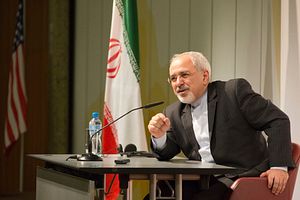On Monday, Japanese Foreign Minister Fumio Kishida met with his Iranian counterpart, Mohammad Javad Zarif, in Tehran. During their meeting, Japan and Iran agreed to speedily conclude a bilateral investment treaty and discussed how Japan can help Iran implement the July 14 nuclear accord reached with the U.S. and five other major powers.
The bilateral investment treaty will help Japanese firms start developing oil fields and begin conducting other business operations in Iran. The investment treaty is meant to end discriminatory restrictions against companies operating in each other’s country and to reduce business risks by protecting companies’ rights and assets.
Intergovernmental negotiations only began a month ago, and have progressed with remarkable speed. Tokyo is eager to accelerate the process because they fear they are falling behind European nations and China when it came to negotiating access to this large, Middle Eastern market. Tehran has already signed similar investment agreements with 52 countries, including Germany, France, China, and South Korea. Resource-poor Japan also wants to improve relations with oil-rich Iran in order to stabilize Japan’s access to Iranian crude oil and natural gas.
Japan also agreed to help Iran fulfill its end of the nuclear accord. Japan will provide know-how on earthquake preparedness and emergency measures at nuclear energy facilities – both hard-won lessons after the Fukushima meltdown disaster in March 2011. Part of the deal that Iran struck with the world powers requires Iran to establish a “nuclear safety center” to gather expertise on nuclear energy, and Japanese nuclear energy experts who will help map Iran’s nuclear safety strategy are expected to arrive at the center next year or later.
In addition, a bilateral council will be set up to coordinate how Japan and Iran can comprehensively cooperate on a range of issues including economic relations, the environment, and medical care.
Japan’s postwar grand strategy has generally meant aligning with the world’s superpower, the United States, and upholding a rules-based international order. Japan’s security is guaranteed not only by its security alliance with the U.S., but also by international buy-in into norms such as the sanctity of all states’ territorial integrity and nuclear non-proliferation. This sometimes puts Japan in a difficult position, or a position that conflicts with Japan’s narrowly defined self-interests, as in the case of the ongoing economic sanctions against Russia.
From this perspective, the Iran deal was an important breakthrough for Japan as well, even though Japan did not directly participate in the negotiations. As with Japan’s current situation vis-à-vis Russia and the Ukrainian crisis, Japan did not really have the latitude to independently deal with Iran. But now, as Kishida said at a joint news conference with Zarif, “We [Japan] are looking at what we can do to capitalize on the nuclear deal.”
What next in Japan-Iranian relations? Iranian President Hassan Rouhani conveyed his invitation for Prime Minister Shinzo Abe to visit Iran through Kishida during their meeting on Tuesday. Kishida responded that Abe wishes to visit Iran at “an appropriate time.” As Iran is welcomed back into the fold of the international community by making progress towards fulfilling the requirements of the nuclear deal, expect to see greater cooperation between Japan and Iran.

































